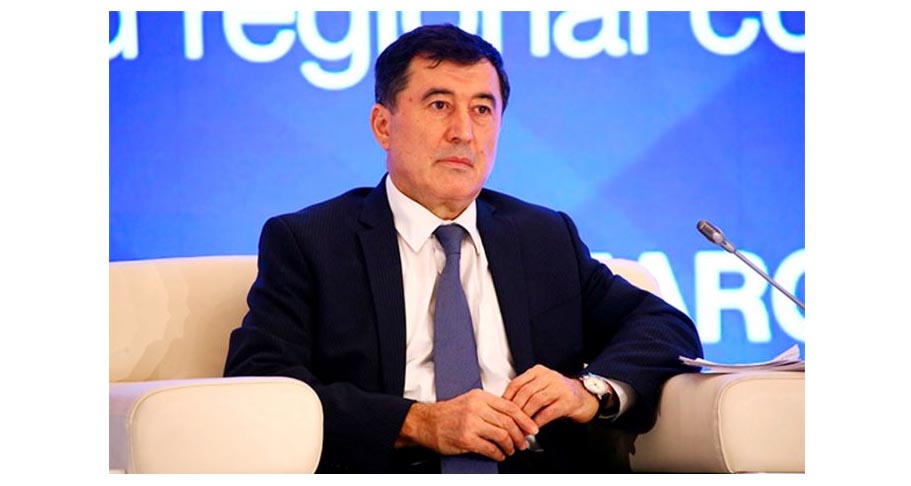SCO Secretary General Vladimir Norov
1 .The year 2021 is a landmark year for the Shanghai Cooperation Organization (SCO)-June 15 marked twenty years since its formation. The past two decades have confirmed that the strategic decision to create the SCO made in June 2001 by the heads of the founding states, turned out to be correct and far-sighted. Since its establishment in a short period by historical standards, having passed a long and glorious path of its formation and development, the SCOhaving withstood the test of time, has become one of the world’s largest systems of regional cooperation with an emphasis on guaranteeing political stability, strengthening security and expanding trade and economic cooperation, is firmly guided by the principles of the “Shanghai Spirit”, which has proved its relevance, vitality and international attractiveness.
Today, the SCO has achieved significant results in its activities and has earned wide international recognition as an authoritative and influential intergovernmental regional organization, is perceived in the international arena as a reliable and predictable partner.
The creation of the SCO was, first of all, the result of profound changes in the international landscape caused by the collapse of the bipolar system, the emergence of independent states in the center of Eurasia, non-traditional challenges and threats to regional and international security.
The Declaration on the Establishment of the SCO of 2001 states that the cooperation of states within the framework of the new Organization will contribute to a more effective joint use of the opening opportunities and to countering new challenges and threats in the conditions of the dynamic development of the processes of political multipolarity, economic and information globalization in the XXI century.
For the first time in the vast geopolitical space – the Eurasia region – a political structure has emerged in the form of a multidisciplinary international association, whose work is based on the principles of partnership, equality and consensus decision-making.
The Organization has set a unique precedent for a stable unification of states that radically differ in military and political potential, financial and economic power, and socio-cultural traditions.
This became possible due to the fact that the founding States were able to form a common denominator that meets mutual interests and approaches, the cornerstone of which is taking into account the interests and mutual respect for each other, refusing to interfere in internal affairs, force methods and claims to dominance.
In a short period of time, our Organization has managed to solve a complex of complex tasks on its institutional and ideological design, create a solid legal framework and effective mechanisms of interaction.
The principles of the “Shanghai Spirit”, which are the basis of the activities of our Organization, have defined the ideological and political essence of the SCO as an equal partnership of small and large states and serves as an important guideline in resolving international differences through peaceful political and diplomatic means.
For two decades, the Organization’s activities have been aimed at strengthening good-neighborliness, mutual trust and mutual respect for the cultural and civilizational diversity of the Member States, constructive partnership, expanding comprehensive political and economic cooperation, jointly ensuring and maintaining peace, security and stability in the region, advancing towards the creation of a democratic, just and rational new international political and economic order based on equal, joint, indivisible, comprehensive and sustainable security, ensuring the interests of each and every State in accordance with the norms and principles of international law.
Today, the SCO is entering its third decade, a fundamentally new period of its development, due to serious changes in the region and the world as a whole. Currently, international relations are going through a stage of deep transformation, strengthening new political and economic centers of influence, forming a world order based on the principles of multipolarity, strengthening the regional level of global governance and strengthening the positions of developing countries. Under these conditions, the SCO makes a significant contribution to the construction of a new type of international relations embodying mutual respect, justice, equality and mutually beneficial cooperation.
Reaffirming their firm support for the efforts of the UN as a universal multilateral organization that plays a central and coordinating role in maintaining international peace and security, stimulating global development, promoting and protecting human rights, the SCO stands for preserving the key place of the UN Security Council in the system of maintaining international peace and security provided for by the UN Charter.
2. After 20 years, we can confidently state the significant stabilizing role of our Organization in the region, despite the existence of a number of hotbeds of protracted armed conflicts near its borders.
In this context, we can note the consistent and effective work of the SCO Regional Anti-Terrorist Structure, with the coordinating role of which systematic measures are being taken to eliminate the causes, sources and manifestations of terrorism, separatism and extremism in our countries.
Taking into account the growing scale of international terrorism, the emergence of opportunities for them to conduct military operations in the full sense of the word, defense departments have joined anti-terrorist cooperation within the SCO, a Meeting of Defense Ministers of the member states has been established as the SCO’s statutory body.
Regular anti-terrorist exercises by law enforcement agencies and the armed forces of the member States – the “Peace Mission” – have become part of the practice. At the same time, it should be emphasized that the SCO is devoid of any attributes of a military alliance: it does not and cannot have supranational command or at least coordination structures in the defense sphere, especially multinational military contingents.
In addition, the special border operations “Solidarity – 2019-2021”, the joint anti-terrorist exercises of the competent authorities “Sary-Arka – Anti-Terror – 2019” and the joint anti-terrorist exercises of the competent authorities of the SCO member states to identify and suppress the use of the Internet for terrorist and separatist purposes “Xiamen-2019″are of particular importance.
Taking into account the continuing danger of merging terrorism and extremism with transnational criminal groups, the use of proceeds from drug trafficking to finance terrorist activities, the efforts of the Organization’s member countries are focused on countering drug trafficking, preventing and treating drug addiction.
In the fight against drug trafficking on the territory of the SCO countries, the international anti-drug operation “Web”, jointly conducted in the Organization’s space, plays a special role in the practical field.
A new important area of cooperation has become joint work to ensure international information security, the main content of which is formulated in the Statements of the SCO SGG on countering the spread of terrorist, separatist and extremist ideology, including on the Internet, and on cooperation in the field of international information security in 2020.
The SCO, without exaggeration, is the engine of international efforts to develop rules, norms and principles of responsible behavior of states in the information space with the key role of the UN. In other words, the Organization has become an initiative, constructive and creative player not only on regional, but also on global platforms.
3. The political situation in the world and, especially, around the countries of the Shanghai Organization at this stage continues to be turbulent. In addition, there is a tendency to escalate tensions in the regions adjacent to the SCO space, where new hotbeds of international instability have appeared.
In the current conditions of the complete withdrawal of foreign troops from Afghanistan, the role and importance of the SCO in normalizing the situation in this country has significantly increased.
The SCO member States consider it important to responsibly restore the legitimacy of state power in Afghanistan through an inclusive peaceful dialogue, taking into account the interests of all social, political, ethnic and religious groups of the country. They appeal to all the political forces of this country to take the necessary measures to normalize the situation, restore peace, economic development, and counter terrorism, extremism and drug crime.
At the same time, the SCO member states confirm their intention to assist Afghanistan in becoming a peaceful, stable and prosperous country free from terrorism, war and drugs. They are ready to participate in international efforts to stabilize and develop Afghanistan with the central coordinating role of the UN.
The Foreign Ministers of the Organization’s member countries at a meeting in Dushanbe in July 2021 within the framework of the SCO-Afghanistan Contact Group stated that they would support the SCO in fulfilling its important role in achieving peace and reconciliation in Afghanistan, and reaffirmed their commitment to strengthening coordination and cooperation at the regional and international levels in order to promote lasting peace and sustainable development in Afghanistan.
The SCO countries are currently considering a Plan of practical measures to promote the socio-economic reconstruction of Afghanistan.
4. The SCO has withstood the coronavirus test, the member states have shown a high level of solidarity, mutual support and cohesion throughout the Organization. Currently, the SCO member states face a common task – the fight against the epidemic, the restoration and development of the economy, the fight against poverty and ensuring an adequate standard of living for people.
The SCO space is a huge platform for mutually beneficial trade and economic cooperation, the implementation of joint projects covering almost all sectors of the economy.
The total GDP of all the countries of the Organization in 2020 reached 23% of the total world figure, by 2030 it is expected to grow to 35-40 % of the world GDP. The foreign trade turnover of the SCO member states amounted to more than $ 6.3 trillion. Targeted programs and other documents have been adopted to realize the huge potential for ensuring economic growth in our countries, there are good practices in the areas of economic cooperation, industry, food security, transport, interregional measurement, digitalization, energy, high technologies, development of remote territories, transition to mutual settlements in national currencies.
Currently, for the implementation of the adopted documents, it is extremely important to carry out specific project activities with the participation of interested SCO member states, observers and dialogue partners. In addition, the necessary prerequisites have been created for reaching a fundamentally new level in economic cooperation. There are reasons to expect a qualitative breakthrough also in innovative areas, such as “green” energy, digital economy, etc. At the same time, the development of the digital economy and modern IT technologies can play a decisive role in overcoming the negative consequences of the COVID-19 pandemic and creating new sources of growth in the SCO space, which is a huge market for implementing relevant innovations
The member states of the Organization are focusing their efforts on the consistent implementation of the SCO member States ‘ Cooperation Program on Food Security and the Plan for its Implementation. In order to ensure uninterrupted supply of products of the agro-industrial complex, which is a key factor of food security and socio-economic stability in the SCO space, the organization’s member countries focus on the development and implementation of joint transport infrastructure projects, in particular in the field of optimization of multimodal transport, the formation of logistics centers for cross-border e-commerce, as well as the expansion of the use of digital technologies and intelligent systems in transport.
It is the intensification of multilateral trade and economic cooperation that should become the main strategic task of the coming decade of the SCO’s activities.
The SCO is an effective and efficient platform for combining the national interests of the member states with regional ones, implementing transcontinental and regional initiatives, such as the Belt and Road, North-South, the Great Eurasian Partnership, the SCO Green Belt and others.
Without exaggeration, the Organization has become an effective “center of attraction” for many countries of the world. The SCO member states consistently build non-aligned, non-confrontational and constructive partnerships that are not directed against “third” parties. Guided by and implementing the principle of openness of the SCO, in accordance with the Charter and other regulatory documents, our Organization develops cooperation with the UN and its specialized bodies, as well as the CIS, CSTO, ASEAN, ECO, CICA and others.
5.On September 16-17, 2021, the anniversary meeting of the SCO Council of Heads of State is scheduled to be held in Dushanbe, which will be the final event of the successful chairmanship of the Republic of Tajikistan in the SCO in 2020-2021.
The Dushanbe Summit will undoubtedly become an important historical event, at which the heads of state will sum up the results of the Organization’s 20-year activity and determine the prospects for its further development.
The decisions to be taken by the leaders of our countries will open a new page in the progressive development of the Organization, multiply its contribution to maintaining peace and stability in the region and in the world, ensuring sustainable development and strengthening cultural and humanitarian cooperation in the vast space of the SCO.
The Republic of Tajikistan, as one of the founding countries of the SCO, makes a great contribution to the development of the Organization. During its chairmanship, the Tajik side initiated 80 events.
Based on the Plan of the Tajik Chairmanship and the proposals of the parties, at the beginning of this year, a Plan of major events for 2021 was developed and approved by the member states, which included 153 different meetings and meetings of the SCO bodies and a meeting of the Council of Heads of Government in November this year in Kazakhstan.
The pandemic has made its own adjustments to the dynamics of our joint work. Nevertheless, in the jubilee year under the chairmanship of Tajikistan, it is possible to consistently implement all the points of the SCO’s Main Activities Plan.
The process of approving the documents planned for submission to the heads of state for consideration, as well as signing on the sidelines of the SCO SGG meeting, is at the final stage. All the mechanisms involved are involved – the Council of National Coordinators and special expert working groups. Since the beginning of the year, more than 100 meetings have been held at various levels.
To date, a solid list of documents has been prepared that are planned to be signed during the SCO SGG meeting, of which three – quarters will be signed at the level of heads of state, the rest-at the level of heads of ministries, departments and international organizations.
The main document of the summit is the Dushanbe Declaration of the twentieth Anniversary of the SCO, which will reflect the main results of the SCO’s twenty — year activity, record consolidated assessments of the heads of the SCO member states of the current situation in the region and in the world and the common position of the SCO member states on key issues of regional and global policy, as well as outline the fundamental directions of the organization’s work for the near future.
The leaders of our countries will make decisions on expanding the SCO family, in particular, accepting new dialogue partner countries and launching the negotiation process for full membership in the SCO. This is clearly confirmed by the principle of openness of our Organization and our firm intention to follow it in practice.
Significant progress has been made in improving the mechanisms for countering new challenges and threats to the security of the SCO member states, taking into account the relevant initiatives of the parties. At the upcoming summit, it is planned to approve planned documents on combating the three “forces of evil”, ensuring international information security and implementing an Anti-drug strategy.
The leaders of the SCO countries will approve a number of documents aimed at further development of trade and economic relations in the SCO space. The summit is expected to approve a Plan of joint measures to overcome the negative socio-economic consequences of the pandemic, the Concept of the SCO Economic Forum, the SCO Green Belt Program, and the adoption of a Statement on food security is also expected.
The substantive part of the summit will also be rich in cultural and humanitarian components. The Regulations on the SCO Anthem, the Action Plan for the implementation of the Concept of Cooperation in the Field of Environmental Protection, the Regulations on the Tourism and Cultural Capital of the SCO, as well as a Statement on strengthening cooperation in the field of science, technology and innovation are submitted for approval by the Head of States.
It is expected that “on the sidelines” of the summit, the heads of the ministries involved will sign an agreement on cooperation in the field of work with youth, an agreement on cooperation in the field of protection, preservation and restoration of historical monuments and cultural heritage objects, as well as a Memorandum on cooperation between higher and secondary specialized educational institutions of culture and art.
In addition, the heads of state will approve the candidacy of the People’s Republic of China for the post of SCO Secretary General and the candidacy of Uzbekistan for the post of Director of the SCO RATS Executive Committee for a period of three years, as well as the Consolidated Report “SCO – 20 years: state and prospects”.
Decisions on the establishment of SCO partnership relations with LAS, UNIDO, UNCTAD and INCB will be signed. The heads of the SCO Secretariat and the Eurasian Economic Commission will conclude a Memorandum of Understanding.
6. According to the established tradition, following the results of the summit, a decision will be made on the next presiding state in the SCO. According to the SCO Rules of Procedure, it will be transferred to the Republic of Uzbekistan, which, being one of the SCO founders, chaired this organization three times, i.e. in 2003-2004, 2009-2010 and 2015-2016.
In 2021-2022, Uzbekistan will chair the Shanghai Cooperation Organization for the fourth time, each time making a significant contribution to the further development , strengthening the role and increasing the authority of the Organization on the world stage.
It should be noted that Uzbekistan has started preparing for its upcoming chairmanship in the SCO in advance. In February of this year, President of the country Shavkat Mirziyoyev signed a resolution on preparations for the SCO summit in Uzbekistan, which will be held in 2022. The document approves the composition of the Organizational Commission for preparing for the main events within the Organization.
It is planned to launch a special website that will be updated with information related to Uzbekistan’s chairmanship in the SCO.
At the upcoming Dushanbe summit, the leader of Uzbekistan will announce the priorities of the chairmanship, the implementation of which will involve the SCO mechanisms involved. Currently, work is underway to agree on a Plan for the presidency of Uzbek side, which will be submitted to the partners for consideration in the very near future.

















